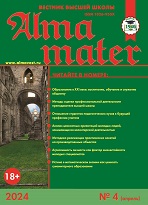UDC 323.2-053
https://doi.org/10.20339/AM.04-22.019
Elena I. Vasileva, Cand. Sci. (Sociology), Associate Professor of sub-faculty of Regional and Municipal Management at Russian Presidential Academy of National Economy and Public Administration, e-mail: vasileva-ei@ranepa.ru
Alena S. Nikitina, Cand. Sci. (Sociology), Associate Professor of sub-faculty of Administration of Personnel at Russian Presidential Academy of National Economy and Public Administration, e-mail: nikitina-as@ranepa.ru
At present, participation in protests is becoming an increasingly popular and relevant form of participation. At the same time, this trend is more characteristic of young citizens, who make up a significant part of the participants in the protest actions. The purpose of the study is to determine the impact of the level of education on the protest activity of modern Russian youth. The article presents the results of a survey of Russian youth conducted in July 2021 (n = 2302 people). On the basis of the empirical data obtained, it was revealed that the level of education and age of the participants in protest actions have a direct impact on the nature and format of protest events. The level of education is one of the factors that determine the format and content of online and offline protest practices: the higher the level of education, the more ideological and conscious the practices themselves are. At the end of the article, the authors formulate the main conclusions and suggest directions for harmonizing the protest potential of modern Russian youth.
Key words: youth, education, protest, protest actions, protest activity, protest factors.
References
1. Dalton, R.J. The participation gap: Social status and political inequality. Oxford: Oxford University Press, 2017.
2. Antoshin, V.A., Antoshin, A.V., Kolesnikova, K.I. Protest potential and protest activity of modern Russian youth: value dominants, dynamics and trends. Alma mater (Vestnik vysshei shkoly). 2021. No. 12. P. 93–101. DOI: 10.20339/AM.12-21.093.
3. Sloam, J. Voice and Equality: Young People’s Politics in the European Union. West European Politics. 2013. Vol. 36. P. 836–858.
4. Klenova, M.A. Protest activity as a form of manifestation of social activity of youth. Russian political science. 2020. No. 1(14). P. 87–92.
5. Zerchaninova, T.E., Nikitina, A.S. Trends in civic engagement of Russian youth in municipalities. Alma mater (Vestnik vysshei shkoly). 2021. No. 4. P. 90–94. DOI: 10.20339/AM.04-21.090.
6. Van Zomeren, M., Postmes, T., Spears, R. Toward an Integrative Social Identity Model of Collective Action: A Quantitative Research syn- Thesis of Three Socio-Psychological Perspectives. Psychological Bulletin. 2008. Vol. 134. P. 504–535. DOI: 10.1016/j. jesp.2010.05.006.
7. Makarenko, K.M. “New protests” in Russia: problems of theory and practice. Theories and problems of political research. 2020. Vol. 9. No. 5-1. P. 48–55. DOI: 10.34670/AR.2020.38.90.006.
Acknowledgments: The reported study was funded by RFBR and EISR, project № 21-011-31682.












.png)






